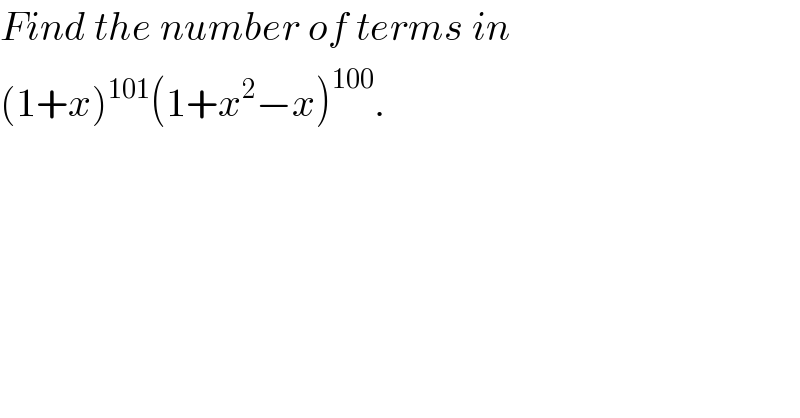Question Number 855 by 112358 last updated on 26/Mar/15

$${Find}\:{the}\:{number}\:{of}\:{terms}\:{in} \\ $$$$\left(\mathrm{1}+{x}\right)^{\mathrm{101}} \left(\mathrm{1}+{x}^{\mathrm{2}} −{x}\right)^{\mathrm{100}} . \\ $$
Answered by prakash jain last updated on 26/Mar/15
![=[(1+x)(1+x^2 −x)]^(100) (1+x) =[1+x^2 −x+x+x^3 −x^2 ]^(100) (1+x) =[1+x^3 ]^(100) (1+x)=(1+x^3 )^(100) +x(1+x^3 )^(300) (1+x^3 )^(100) =Σ_(i=0) ^(100) ^(100) C_i x^(3i) (101 terms) ...(i) x(1+x^3 )^(100) =Σ_(i=0) ^(100) ^(100) C_i x^(3i+1) (101 terms) ...(ii) Total number of terms =202 since no common terms in (i) and (ii).](https://www.tinkutara.com/question/Q856.png)
$$=\left[\left(\mathrm{1}+{x}\right)\left(\mathrm{1}+{x}^{\mathrm{2}} −{x}\right)\right]^{\mathrm{100}} \left(\mathrm{1}+{x}\right) \\ $$$$=\left[\mathrm{1}+{x}^{\mathrm{2}} −{x}+{x}+{x}^{\mathrm{3}} −{x}^{\mathrm{2}} \right]^{\mathrm{100}} \left(\mathrm{1}+{x}\right) \\ $$$$=\left[\mathrm{1}+{x}^{\mathrm{3}} \right]^{\mathrm{100}} \left(\mathrm{1}+{x}\right)=\left(\mathrm{1}+{x}^{\mathrm{3}} \right)^{\mathrm{100}} +{x}\left(\mathrm{1}+{x}^{\mathrm{3}} \right)^{\mathrm{300}} \\ $$$$\left(\mathrm{1}+{x}^{\mathrm{3}} \right)^{\mathrm{100}} =\underset{{i}=\mathrm{0}} {\overset{\mathrm{100}} {\sum}}\:^{\mathrm{100}} {C}_{{i}} \:{x}^{\mathrm{3}{i}} \:\:\:\left(\mathrm{101}\:{terms}\right)\:\:\:…\left({i}\right) \\ $$$${x}\left(\mathrm{1}+{x}^{\mathrm{3}} \right)^{\mathrm{100}} =\underset{{i}=\mathrm{0}} {\overset{\mathrm{100}} {\sum}}\:^{\mathrm{100}} {C}_{{i}} \:{x}^{\mathrm{3}{i}+\mathrm{1}} \:\:\:\left(\mathrm{101}\:{terms}\right)\:\:\:…\left({ii}\right) \\ $$$$\mathrm{Total}\:\mathrm{number}\:\mathrm{of}\:\mathrm{terms}\:=\mathrm{202}\:\mathrm{since}\:\mathrm{no} \\ $$$$\mathrm{common}\:\mathrm{terms}\:\mathrm{in}\:\left({i}\right)\:\mathrm{and}\:\left({ii}\right). \\ $$
